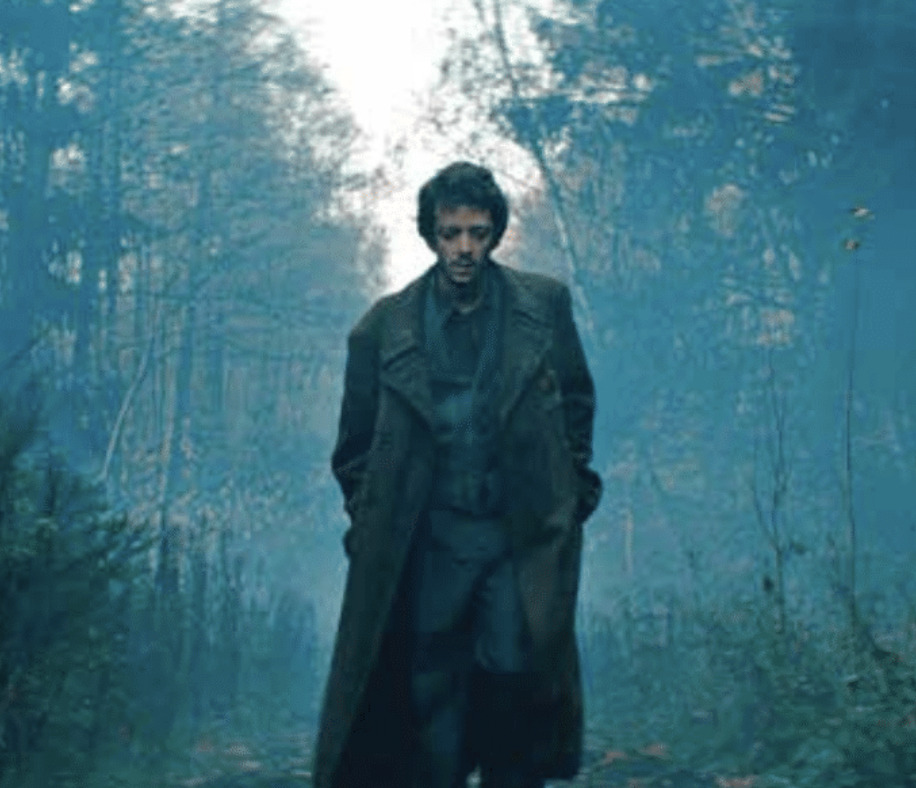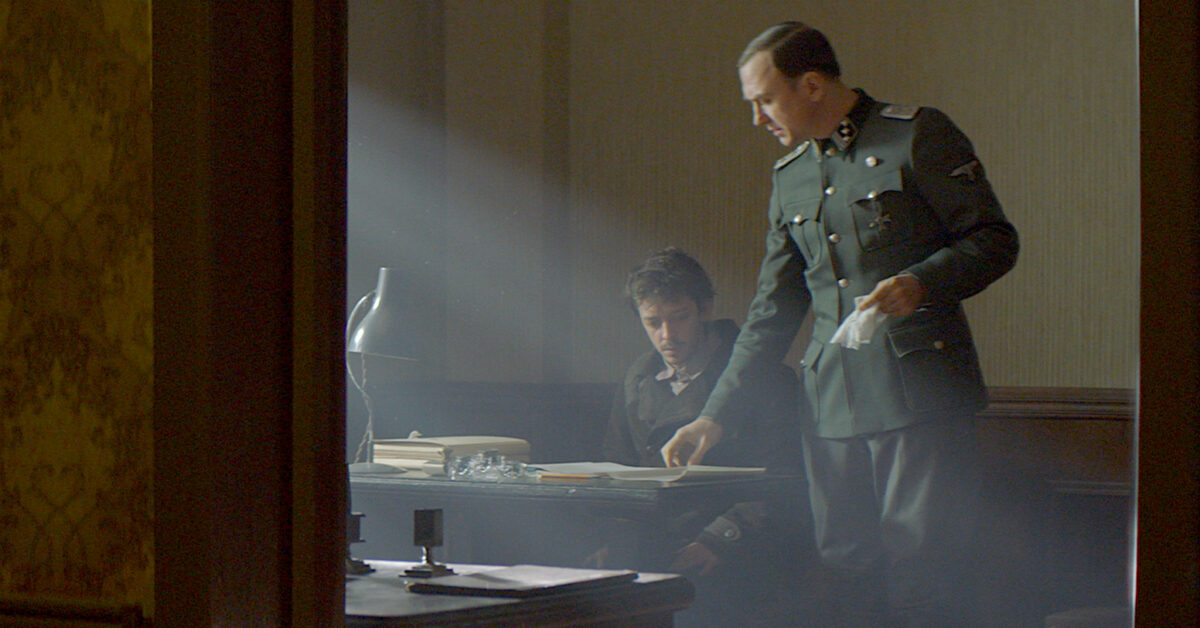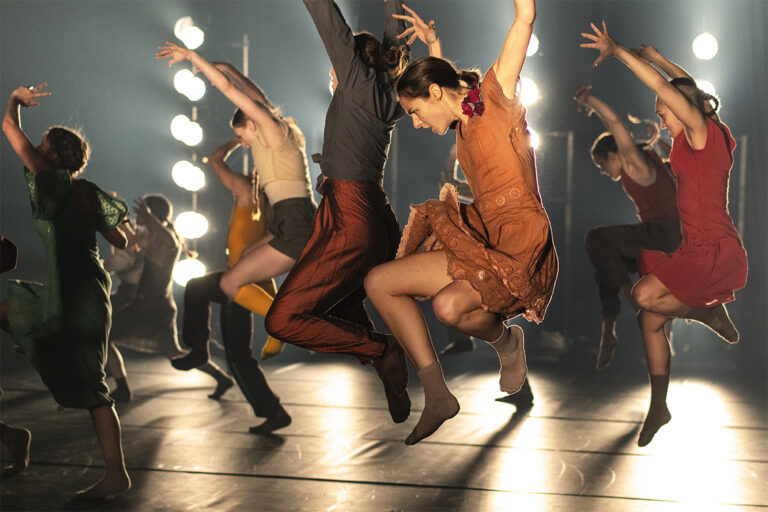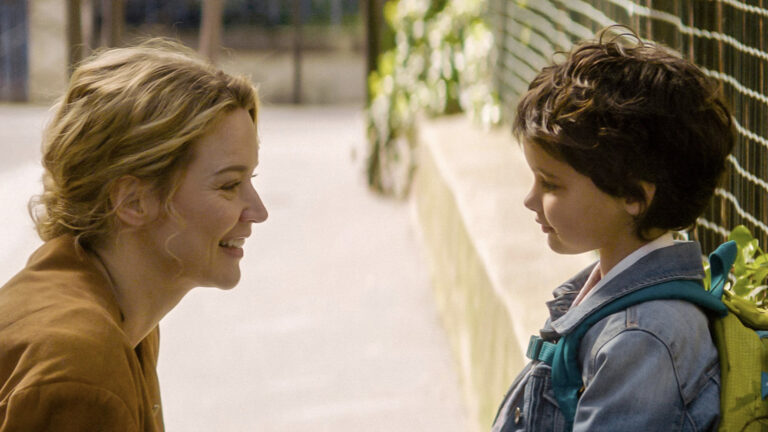It’s 1942 in occupied France. Gilles (Nahuel Pérez Biscayart), a Belgian Jew, is crammed into the back of a truck with other Jews who have been rounded up by SS soldiers to be transported to a Nazi camp. When the man seated next to him offers to trade him a stolen book of Persian legends for his sandwich, he agrees. And when the guards inexplicably start shooting, Gilles saves himself from the firing squad by insisting that he’s not Jewish, but Persian, holding up the book as evidence. They don’t believe him. After all, who wouldn’t make up a story to save himself?
But with golden light setting over the wooded glade, a miracle occurs. One of the guards remembers that Koch, the officer who runs the kitchen at the Nazi transit camp where they work, is looking for a Persian to teach him Farsi. He’s even offering a stock of canned meat to whomever can locate one. Back at camp, everyone still suspects that Gilles is lying, but he is clever, creative, and desperate to save his own life, and he manages to convince the only person who matters that he indeed speaks Farsi. For months he teaches Koch (Lars Eidinger) words that he passes off as Farsi. In fact, he is inventing an entire nonsensical language, in which he and his student carry on conversations. Around them, Nazi soldiers bicker, flirt, and betray one another, while the Jewish prisoners are forced at gunpoint to do grueling work. Occasionally someone is shot for perceived misbehavior and every few months, the camp is cleared out, and the prisoners transported to other camps where they will be killed.
The film’s premise is implausible. The absurdity and humor of Gilles’ efforts and the Nazi shenanigans around them feels uncomfortable and misguided at times in the context of the Holocaust, yet it is never pushed into full-fledged satire, which might make it more palatable. And yet, playing Gilles, Nahuel Pérez Biscayart is so convincing, we cannot help but be pulled in by his outrageous scam and the horrifying risks he takes. This man, with his haunted, pleading eyes, faces sure death and yet continues to carry out his charade, even as he becomes increasingly aware of the fate of the other Jews around him.
Director Vadim Perelman, originally from Ukraine, began his career with the acclaimed 2003 drama House of Sand and Fog. In his new film, he treads a tricky line between comedy, satire, and tragic Holocaust tale. Many will dislike or dismiss the film. But no one can deny the power of its final moments, when our eyes are opened to the significance of the deeper work that Gilles has managed to accomplish.
Esteemed film curator Larry Kardish (former Senior Curator of Film at MoMA) was so taken by the film when he saw it at the Berlin Film Festival in 2020 that he created a retrospective around it, screening it from June 2-8 at the Quad Theater in New York. The series, Notes on Persian Lessons, will feature House of Sand and Fog, as well as several films starring its leading actors. (Including Pérez Biscayart playing a young AIDS activist in the French film Beats per Minute, and Eidinger in French director Olivier Assayas’ wonderful Clouds of Sils Maria and Personal Shopper.) Other films in the series feature the work of Persian Lessons’ composer, cinematographer, and producers. Persian Lessons opens on June 9, with a national rollout to follow.
I spoke with Perelman about his haunting story, the powerful performances of its actors, and why it makes sense to make implausible movies about the Holocaust.

What drew you to this story?
I always wanted to make a film about the Holocaust, because I have a personal connection to it. I’m originally from Kyiv, where Babi Yar happened during the war. My mother just barely escaped Kyiv with her mother, and the rest of the people who stayed perished. So for me it’s always been a personal thing. In the gamut of Holocaust films, which is its own genre now, there’s the rub-your-face-in-it kind of films like Son of Saul and Night and Fog, which just show you what happened. The other type is farce, like Jojo Rabbit, and, to a certain extent, Life is Beautiful, where you try to laugh through the tears. This one fit so perfectly in the middle of it, I think, and plus I loved the conceit of the story. I loved the language, though I probably wouldn’t have done it if the final scene weren’t there.
This is a story about surviving the Holocaust and also about creating a new language and finding a way to honor those lost. For you, what are the big themes? What is it about?
It’s about this: I took a great chance by humanizing the Nazi character, by giving him the ability to be human on the screen to a certain extent and that ability was given to him with that cockamamie language, that made-up language. For some reason, in that language he could be human and talk about his mother and his fears and his brother. Otherwise, he was just a Nazi, and humanizing him amplifies the horrors of what they did. It’s a morality tale. It’s not just oh, those guys are evil, and oh, those poor Jews. It’s more like, this could happen again, and it will probably never happen again with the Germans in that role, because they’ve been indoctrinated to never let that happen again. It might be the other way around. It might be us, the Jews. It might be the Russians.
For your country, it’s Russians right now.
For the whole world, it’s Russians right now.
What was the reception like at the Berlin Film Festival?
It got a 15-minute standing ovation, until they had to kick everybody out of the theater. They wouldn’t stop clapping. It was Germans mostly, which was kind of interesting, and they laughed a lot, so I thought they were really enjoying it.
Most of the humor involved the Nazi characters, the secret lives of Nazis.
They laughed at that. It was like a reality show with the Nazis in the camp.
The story feels implausible, farfetched, unlikely. In real life this man never could have survived.
I think there are more implausible stories that happened during this time, not just about survival but falling in love at a camp just before death, or actually surviving the chambers and ending up living in Israel together after that. You can’t beat life as far as the absurdness and the coincidences. This is kind of a fable. I say this is inspired by true events, but it’s inspired by things that happened all the time, by the Holocaust itself, by the Nazis.
Lars Eidinger as Koch and especially Nahuel Pérez Biscayar as Gilles are astounding in the starring roles. How did you find them? How did you know they were the right actors?
I do a really, really, almost nauseatingly controlling job of casting. I don’t want to see 10 people, I want to see 100, from all over the world. We were very lucky we didn’t need a name to finance this film, an American actor, like Jake Gyllenaal, so thankfully I was open to just great actors. Not that Nahuel isn’t well known in his milieu, but he wasn’t to me. It was obvious right away. There was a casting director in Germany who pointed me to him and then we did a Zoom and I flew to Paris. The amazing thing is he doesn’t speak a word of German, and he spoke German throughout the whole movie. His native language is Spanish—he’s from Buenos Aires—and he knows French fluently because he lives in Paris, but he doesn’t speak German, so Lars, who plays the Nazi, had to teach him phonetically the lines before their scenes, and he did a bang-up job. The Germans tell me he even speaks with a Belgian French accent.
The irony that Lars had to teach him to speak German!
On the screen, they did it the other way around. Another thing, I don’t speak German either, not a word, and 90% of the film is in German, so it was really, really tough—at first!—and then I started cluing in.
Gilles is such an interesting character. He’s caring and thoughtful, but also a trickster. He’s quick and manages to pull off this ruse for such a long time.
He is a trickster. At one of the Q&As, someone in the audience asked me a question: is he really a rabbi’s son? And I went, I don’t think so. Also the fact that he traded his sandwich for that book that was worth its weight in gold. He was like yeah, I’m gonna scam this guy. The guy’s a thief. He’s a vagabond, a Charlie Chaplin personality. He’s very clever.
Does Koch grow to care about Gilles?
It felt like the relationship the rhino has to the bird that sits on his back and eats pests. It’s the same kind of symbiotic relationship, but he did value the fact that he could be human to this person.
Your first film was House of Sand and Fog, which starred Ben Kingsley and Jennifer Connelly and was an enormous critical success. What an amazing way to start your career!
Yeah, it was! I thought it was gonna be like that all the time. People would say, “It’s not always gonna be that easy,” and I said, “It will be.” It’s very hard to find material to really sink your teeth into. I have to be emotionally moved by something. I can’t just do any movie. That’s why I only have four of them.
Andrea Meyer has written creative treatments for commercial directors, a sex & the movies column for IFC, and a horror screenplay for MGM. Her first novel, Room for Love (St. Martin’s Press) is a romantic comedy based on an article she wrote for the New York Post, for which she pretended to look for a roommate as a ploy to meet men. A long-time film and entertainment journalist and former indieWIRE editor, Andrea has interviewed more actors and directors than she can remember. Her articles and essays have appeared in such publications as Elle, Glamour, Variety, Time Out NY, and the Boston Globe.







